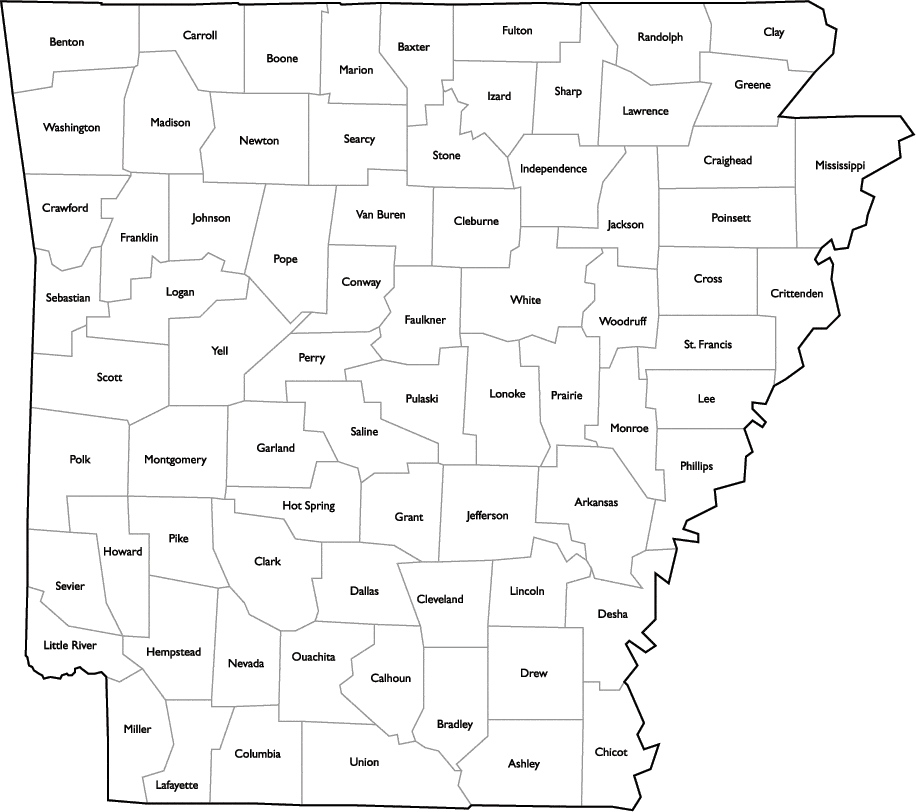Arkansas is known for its Hot Springs, southern hospitality, Walmart, and the home state of former President Bill Clinton.

It originally became part of America when Thomas Jefferson made the Louisiana Purchase and not long after became a territory. Statehood would eventually be achieved and then lost when it seceded from the Union.
Now, the state is home to a growing economy and beautiful scenery. Its most populous city and capital is Little Rock.

Arkansas Quick Facts:

Admitted to the Union: June 15, 1836
Capital: Little Rock
State Bird: Mockingbird
State Butterfly: Diana Fritillary
State Flower: Apple Blossom
State Insect: Western Honeybee
State Mammal: White-tailed Deer
State Tree: Pine Tree
Arkansas Timeline: 1500s
1541: Spanish Conquistador Hernando De Soto leads the first European expedition into Arkansas.
1673: Jesuit Father Jacques Marquette and Louis Jolliet, a trader, travel south on the Mississippi River, intent on missionizing and exploring. In July 1674, they turned back north, having reached the Quapaw villages of “Akansae” or “Kappa” near the confluence of the Arkansas and Mississippi rivers.
1682: Famous explorer Rene Robert de La Salle claims the Mississippi valley for King Louis XIV of France, dubbing the country “Louisiana.” In February, La Salle’s party pauses near present-day Memphis to build Fort Prud’homme, then continues south to the mouth of the river.
1686: La Poste d’Akancas (Arkansas Post) was established by La Salle’s lieutenant, Italian mercenary soldier Henri de Tonty, as a trading post.
1699: Arkansas Post is abandoned.
Arkansas Timeline: 1700
1722: French Explorer Jean Baptiste Benard de La Harpe explores what became Little Rock.
1731: Louisiana, which contained all of Arkansas, becomes a French royal colony.
1738: The French Quapaw and Choctaw tribes ally together to fight the Chickasaw. The Chickasaw was threatening settlers.
1740: Cotton was introduced to the area by the French.
1753: The French and Indian War (known as Seven Years War in Europe) begins against France and England. The war would eventually come to the colonies.
1762: The war ends with the Treaty of Paris, which results in the French giving up most of the North American possessions to England.
1779: The Arkansas Post moves to Escores Rouges site where it is today.
Arkansas Timeline: 1800s
1803: Napoleon Bonaparte sells the territory of Louisiana to the United States.
1819: Arkansas becomes a territory.
May 6, 1828: The Cherokee Indians were forced off of their reservation located in Arkansas. The move would split the tribe as one group of the Cherokees moved to Oklahoma while the others stayed behind. The group that stayed behind would become known as the Lost Cherokees.
1832: The thermal springs in Hot Springs, Arkansas, become a federal reservation.
June 15, 1836: Arkansas is admitted into the Union as the 25th state.
September 11, 1857: The Mountain Meadows Massacre occurs when John Doyle Lee slaughters 137 Mormon settlers.
February 28, 1859: The Arkansas legislature requires free blacks to choose exile or slavery.
February 12, 1861: Arkansas state troops seize United States munitions in Napoleon, Arkansas.
April 23, 1861: State troops take control of Fort Smith as talks of secession increase.
May 6, 1861: Arkansas secedes from the Union. They would be the ninth to do so.
March 6-8, 1862: The Battle of Pea Ridge takes place and would result in a Union victory.
July 12, 1862: Union troops begin their occupation of Helena, Arkansas.
October 22, 1862: 5The Second Battle of Pea Ridge results in 5,000 confederate troops being pushed out of Maysbille, Arkansas.
November 28, 1862: The Battle at Cane Hill takes place and is a Union tactical victory that would set the stage for the Battle of Prairie Grove the next month.
December 7, 1862: The Battle of Prairie Grove is tactically a draw but gives the Union control of northwestern Arkansas.
January 11, 1863: Union forces capture the infamous Arkansas Post.
July 4, 1863: Confederates lose 640 men when their assault on Helena is repelled.
August 1, 1863: Mark the beginning of the Chattanooga campaign.
September 10, 1863: The Battle of Bayou Fourche seals Little Rock's fate with a Union Victory.
January 8, 1864: David O. Dodd, a teenager, was hanged by Union troops for espionage. He chose to hang out rather than betray the Confederate cause.
April 15, 1865: General Steele occupies Camden, Arkansas. Here believed there to be supplies located in Camden, but the rebels had already destroyed them. He did learn of
April 25, 1864: Confederates with the Battle of Marks Mill.
October 25, 1864: The Battle of Mine Creek takes place and is a Union victory.
May 9, 1865: The Civil War ends. Over the next several months, there would be some holdouts, which included Stand Waite. However, by the end of the year, the war was over.
June 22, 1868: Arkansas was re-admitted to the Union.
March 13, 1869: Arkansas legislature passes an anti-Klan law.
1874: Arkansas passed a constitution that included a ban on gambling.
November 27, 1887: Frank Dalton was killed in the line of duty near Fort Smith, Arkansas.
November 1895: A group of 98 Italian families arrived in New Orleans. Each family had bought land on credit and would be paid back in cotton crops from work at the Sunnyside plantation. The plantation was owned by Austin Corbin, who was a founding member of the American Society for the Suppression of Jews.
1898: Tontitown was founded and named after Italian explorer Henri de Tonti. The town was founded by 40 families originally from the Sunnyside plantation.
Arkansas Timeline: 1900s - Modern Times
1900: The cornerstone for the new state capitol is laid on November 27 on the former grounds of the state penitentiary overlooking downtown Little Rock. By the end of this year, forty-two Arkansas counties will have banned liquor sales.
1903: On A Slow Train Through Arkansas is published. A collection of hillbilly and racial humor with little connection to Arkansas realities, it nevertheless contributes to the popular perception of Arkansas as an eccentric, ignorant rural backwater. Although there are only fifty automobiles in the entire state, their owners form the Arkansas Good Roads Association to promote route construction, repair, and maintenance.
1906: Diamonds are discovered in Pike County, the first such deposit to be found in the United States.
1907: Arkansas coal mines produce more than 2,750,000 tons.
1910: William Jennings Bryan visits Arkansas to promote the initiative and referendum.
1915: Little Rock: Arkansas’ General Assembly passes a statewide prohibition of liquor sales and manufacture. The state Capitol is completed.
1917: Arkansans muster in for service during the First World War; approximately 72,000, including African-Americans and women, will serve. Some 2,000 will die, most from disease and accidents.
1919: A race riot erupts in Elaine (Phillips County) in October. Between 30 and 100 deaths result; the riot leads to an investigation, convened by Governor Charles Brough, of the issues dividing black and white Arkansans.
1921: Oil is discovered near Smackover.
1922: Radio station WOK goes on the air, broadcasting from Pine Bluff.
1925: The state Supreme Court ruled in Brickhouse v. Hill that Amendments 7, 8, and 9 (initiative and referendum, woman suffrage, and an enlarged Supreme Court) were all in effect.
1927: Floods scour farmlands and cities along the Mississippi.
1928: Arkansas has over 8,700 miles of roads, one-fourth of them paved. Forty-six counties feature some paved roads; two counties have no improved roads at all.
1931: By the end of this year, nearly half the Arkansas businesses operating in 1929 were closed, including 192 banks.
1932: Mrs. Hattie Caraway, named in 1931 to fill out the Senate term of her deceased husband, wins a term on her own in November, the first woman elected to the United States Senate.
1936: The Waterbury Clock Company opens a facility in Little Rock; later renamed US Time and, finally, Timex. The facility will be the last remaining American manufactory of wristwatches by the time it closes in 2001.
1939: The Magnet Cove Barium Corporation begins mining in Saline County. By 1941, the mines produce a high-grade barite powder for the nation’s oil industry. Louise Loughborough, a Little Rock socialite and civic leader, begins the task of preserving vintage structures in the heart of the city slated for demolition. Her efforts will lead to the opening, in 1941, of the Arkansas Territorial Capitol Restoration, known today as the Historic Arkansas Museum.
1941: After the attack on Pearl Harbor, Arkansans flock to recruiting stations to join the war effort. Some 200,000 Arkansans will serve; 4611 will die in service.
1942: Internment camps for West Coast Japanese-Americans are established near Jerome and Rohwer.
1942: Fort Smith native William Darby is given the job of training the Army’s Ranger Battalion, elite fighters for the toughest assignments. Darby’s Rangers see their first action in North Africa in late 1942, then in Sicily and Italy in 1943. Darby died in action in 1945.
1944: J. William Fulbright is elected to the United States Senate.
1946: In an early round of the “GI Revolt,” decorated former Marine Sidney P. McMath runs against the Hot Springs political machine for Garland County prosecuting attorney and wins.
1948: Sid McMath is elected governor on a reform platform. Although hampered in some efforts, McMath placed African-Americans on state boards for the first time since Reconstruction, promotes highway construction, and encourages industrial siting in Arkansas.
1953: The Hot Springs Bathers baseball team signs Negro League stars Jim and Leander Tugerson, the first African-Americans to play professional ball in Arkansas. The team is evicted from the Cotton States League, then readmitted after the Tugersons are declared ineligible to play.
1955: Orval Faubus is elected governor. Winthrop Rockefeller, veteran, and grandson of John D. Rockefeller, is tapped to head the Arkansas Industrial Development Commission.
1957: Frank Broyles is hired as head football coach for the Arkansas Razorbacks. He would be the winningest coach in their history.
1958: Little Rock high schools are closed for the academic year while political and social controversy over desegregation continues.
1964: Winthrop Rockefeller is the Republican gubernatorial nominee but loses to Orval Faubus. Rockefeller promises to try again. The Arkansas Razorbacks won the National Championship for College Football.
1966: Winthrop Rockefeller is elected governor. He became Arkansas’ first Republican governor elected since 1874.
1968: In a special session in February, the General Assembly passes 67 bills, including a freedom of Information Act and the state’s first general minimum-wage act. In November, Arkansans ratify Amendment 53, authorizing kindergartens in the state’s free public schools.
1969: The University of Arkansas establishes a multi-campus system.
1970: Dale Bumpers of Charleston is elected governor, promising to rid Arkansas of “the old machine and the money machine.” In February, a federal judge declares the Arkansas prison system unconstitutional.
1974: Dale Bumpers successfully challenges J. William Fulbright in the Democratic primary and wins election to the U.S. Senate. David Pryor of Camden is elected Governor. University of Arkansas Law School professor William J. Clinton lost his race for the Third District Congressional seat.
1975: Following the end of the Vietnam conflict, significant numbers of Vietnamese immigrants were relocated to Camp Chaffee, near Fort Smith, where many eventually settle. On October 11, Professor William Clinton marries Hillary Rodham.
1976: Professor Clinton is elected attorney-general, advocating victim compensation, the rights of the elderly, tough ethics laws for public officials, tighter oversight of utilities, and opposing the twenty-five-cent pay phone call.
1977: The Razorbacks become win their second national championship. However, they never officially claimed the title, as it was a three-way tie between Arkansas, Notre Dame, and Texas.
1978: Attorney-General Bill Clinton is elected governor.
1980: Arkansas is ranked in the top five states in percentage of population over the age of 65 due to the “Retiree Movement.” In May, the Federal government informs Governor Clinton that Camp Chaffee will house 120,000 Cuban “Freedom flotilla” refugees. Bill Clinton was defeated by Frank White, once a Democrat, in his bid for a second term as governor.
1982: Arkansas’ “creation science” law is overturned in Federal District Court; Bill Clinton is re-elected governor.
1983: The Quality Education Act was passed by the General Assembly; education once again became a widely discussed issue within Arkansas.
1984: Voters approve Amendment 63, giving statewide officials four-year, rather than two-year, terms. Clinton is re-elected governor.
1986: Clinton again is re-elected, this time for a four-year term.
1988: The Mississippi Delta Commission is created with the mission of investigating and improving
Delta life.
1990: Governor Clinton wins a fifth term as governor. Latinos are Arkansas’ fastest-growing minority population. Tyson Foods of Springdale is the largest broiler chicken processor in the nation.
1991: On October 3, Governor Clinton announces he will run for the presidency of the United States. Lt. Governor Jim Guy Tucker becomes acting Governor in Clinton’s absence. October 18 sees the last issue of the Arkansas Gazette, the “oldest newspaper west of the Mississippi.”
1992: Bill Clinton is elected the 42nd President of the United States. Lieutenant Governor Jim Guy Tucker becomes governor.
1994: Jim Guy Tucker is elected governor; Sharon Priest is the first woman elected to the office of Arkansas Secretary of State.
March-April 1994: Arkansas Razorbacks win their first and only NCAA Men's Basketball Championship.
1996: Republican Tim Hutchinson is elected to the U.S. Senate, the first of his party in over 100 years to represent the state of Washington. Governor Tucker resigns his office in July and is succeeded by Republican Lieutenant Governor Mike Huckabee. In November, Bill Clinton wins re-election to the Presidency.
1997: Ceremonies at Little Rock Central High School mark the fortieth anniversary of the desegregation crisis. 1998: Mike Huckabee is elected Governor.
2000: Arkansas returns a Republican majority in the Presidential vote.
2002: Bentonville-based Wal-Mart is identified as the world’s largest corporation.
2004: Cache River National Wildlife Refuge, Ivory-billed woodpecker sighting reported.
2004: General Wesley Clark runs for president. William J. Clinton Presidential Center and Park opens.
2006: The Big Dam Bridge opens. It is the longest purpose-built pedestrian/cycle bridge in the nation. Arkansas implements the Help American Vote Act, the largest federal election reform act in history.
2007: Little Rock Schools are released from federal supervision, nearly 50 years after President Eisenhower sent troops to escort nine black students into all-white Central High. The Arkansas Travelers of the AA Texas league debut in their new home, the Dickey-Stephens Field, on the banks of the Arkansas River in North Little Rock.
2008: The Northwest Arkansas Naturals of the AA Texas League debut.
2008: Hillary Clinton and Mike Huckabee run for President of the United States.
2009: The Arkansas Scholarship Lottery goes into effect.
2010: Flash floods swept through Albert Pike Recreation Area, rising from three feet to over 23 feet in less than four hours.19 killed.
2010: The weight of heavy snowfall causes the Mary Woods No. 2 steam wheeler to sink in the early morning hours of January 31 on the White River.
2011: Mississippi River flooded more than 1 million acres of cropland. 63 counties declared disaster areas
2012: In the General Election, Republicans gain the majority in both the state House of Representatives and Senate for the first time
March 11, 2020: The first case of COVID-19 is recorded in Arkansas.
